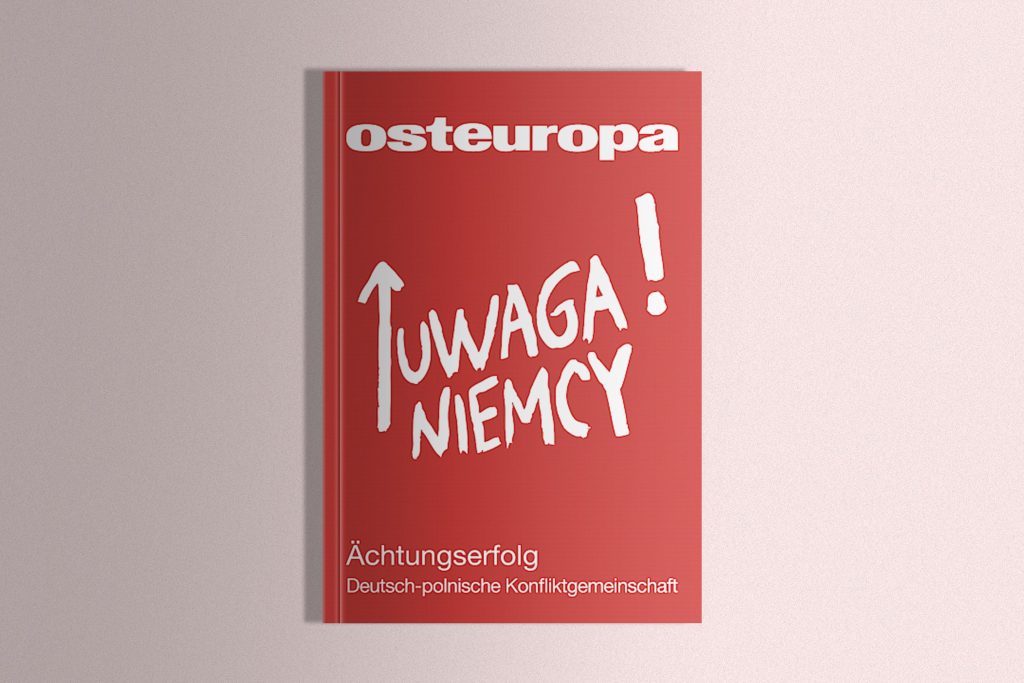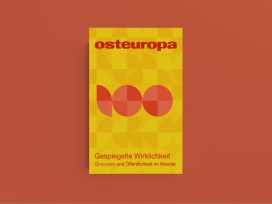‘One would have thought that at the moment of war there would be no doubt about who is the perpetrator and who the victim, about who is the source of aggression and revisionism and who is threatening the security and sovereignty of all the states in central eastern Europe,’ write the editors of Osteuropa in their introduction to the current issue.
‘The Baltic states know this, which is why they welcome the presence of NATO troops in Lithuania. Part of the Polish population knows this too. But the governing coalition between the national conservative PiS and the minnow Solidarity Poland party have a different system of coordinates. For them, the most serious threat currently comes from Berlin.’

Inconvenient facts
PiS is ratcheting up the anti-German rhetoric as the parliamentary elections in September approach, writes Reinhold Vetter. Sometimes, criticism of Germany has a legitimate core; but more often it is propaganda that distorts reality to the point of absurdity.
A favourite trope is that Germany carries the bulk of responsibility for the war in Ukraine, alongside Russia itself. Polish PM Mateusz Morawiecki does not tire of repeating that Germany is ‘the biggest blocker in the EU’ and ‘the main hindrance to stricter measures against Russia’.
This idea is, of course, connected to criticism of German energy policy over the previous decades: criticism that would be legitimate, were it not that PiS overlooks Poland’s own heavy dependency on Russian coal. Now coal imports have been cancelled, many Polish households are worried about their energy supply. Good reason, then, not to mention the topic.
Disloyalty is a brush PiS uses to tar its political opponents. Members of the so-called ‘German party’ include the former deputy marshal of the Sejm and women’s rights activist Wanda Nowicka; the former foreign minister Radosław Sikorski; the former ombudsman for civil rights Adam Bodnar; and Donald Tusk, the leader of the Civic Coalition and the greatest electoral threat to PiS. All have been accused of supporting ‘German hegemony’ in the EU and placing German interests above those of Poland.
Perhaps the most potent message of Poland’s nationalists is the demand for war reparations. Vetter acknowledges that ‘there remains a moral obligation upon German society to repeatedly remember what the Germans did in Poland’. Contributions to the restitution of Polish cultural objects or the financing of buildings destroyed by the Germany in 1944 are commensurate, Vetter argues. ‘But that can only work in a climate in which the facts are openly acknowledged.’
These facts include Poland’s waiving of reparations entitlements according to binding international law and bilateral agreements with Germany, as well as the compensation paid by the German state to Polish victims of the Nazis since reunification. The massive German contribution to the EU structural funding paid to Poland since 2005 also goes unmentioned in the anti-German discourse of PiS.
The old asymmetry
Reparations demands marked a turning point in Polish policy towards Germany, writes Felix Ackermann in a detailed and outspoken article on the asymmetric relations between the two countries since 1945.
After the election of Lech Kaczyński as Polish president in 2005, Poland took the offensive. Under the new populist regime, Poland’s role was no longer that of the long-suffering victim extending its hand to its erstwhile tormentor – a role established by the Polish Catholic Church in the early 1950s – but that of the insurgents of the Warsaw Uprising.
Willy Brandt’s ‘Kniefall’ at the Monument to the Ghetto Heroes in Warsaw is generally seen in Germany as a watershed in national memory policy. In fact, the moment of high symbolism perpetuated the old imbalance. Thanks to Brandt, the figure of the ‘good German’ offered Germans the chance of redemption. But at the state level nothing changed: as Ackermann points out, no reparations were paid to Poland under Brandt.
In the 1980s, it became popular in West Germany to send food packages to Poland – private acts of charity that expressed economic inequality more than anything else. After reunification and Germany’s recognition of the Oder-Neiß line, reparations were off the table: significant parts of the German elite tacitly understood Germany’s dropping of its claim to its former eastern territories as compensation enough.
Throughout the 1990s, ordinary acts of bi-national cooperation were increasingly celebrated as moments of ‘reconciliation’ (coined Versohnungskitsch by critics of the exaggerated sentimentality), while ‘atonement’ (Wiedergutmachung) became the official buzzword.
Projects were set up to provide humanitarian and financial help to Polish victims of the German occupation. The Foundation for Polish-German Reconciliation, which paid reparations to former inmates of German concentration camps and other Polish victims of Nazi Germany, dealt with three million applications. Another 500 million euros were spent on humanitarian programmes via the German foreign ministry.
Nevertheless, writes Ackermann, compensation was largely symbolic. Despite Poland’s accession to NATO in 1999 and to the EU in 2004, acts of symbolic symmetry, asymmetries persisted in the negotiation of interests.
With the full-scale Russian invasion of Ukraine, Poland has entered onto equal footing with Germany for the first time. In the humanitarian and military arenas, Poland has acted quickly, clearly and consistently. But the government is not using its new position of strength to assert its own interests. Instead, PiS is falling back on old habits.
The demands for reparations again made by Kaczyński to kick of the election campaign ‘are ammunition in the fight over the future of the EU’. The aim, writes Ackermann, is to deny Germany’s right to drive EU integration and security policy.
Georgian nightmare
The current regime in Tbilisi – nominally led by Irakli Garibashvili but with oligarch Bidzina Ivanishvili pulling the strings – marks a sea change in Georgia’s gradual pro-western path of development over the past thirty years. For all the faults of past governments, there is no precedent for the authoritarian turn underway since 2020.
In conversation with Osteuropa editor Volker Weichsel, Zaal Andronikashvili talks about the pro-Russia turn in Georgian political life. With the outbreak of full-scale war, the governing party’s fence-sitting has become visible to all:
‘At the latest since 24 February 2022,’ says Andronikashvili, ‘western European governments have come to see through the claim that Russia was provoked in 2008. But Georgian Dream has stuck to its story, and to what it sees as a policy of de-escalation.‘







